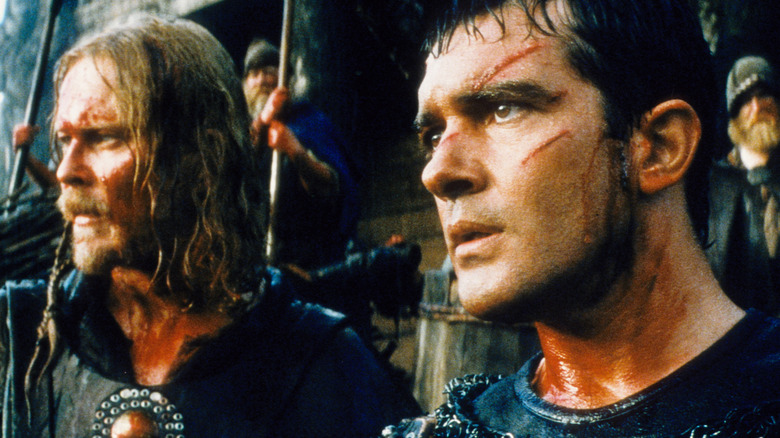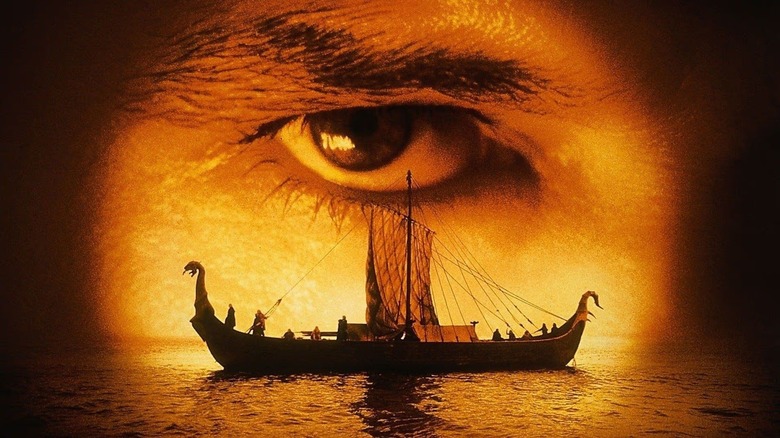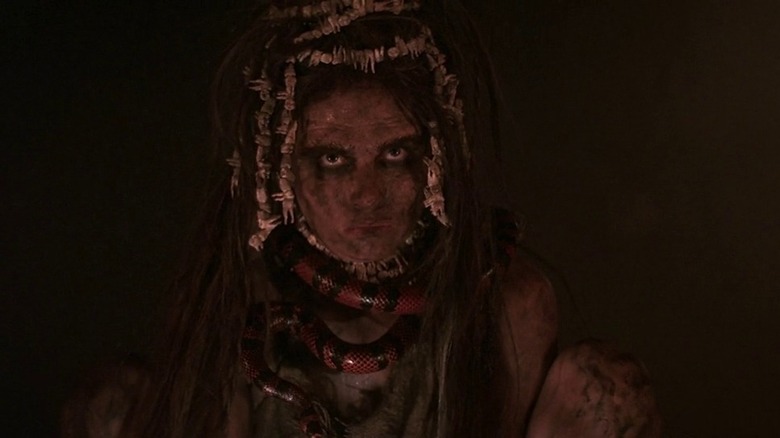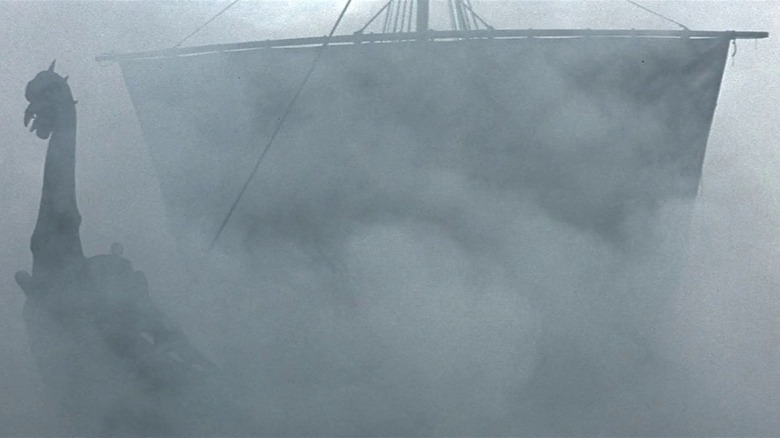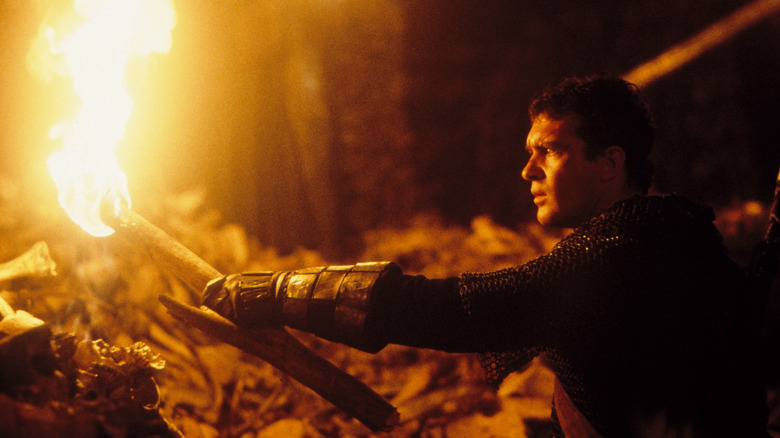25 Years Ago, A Forgotten Historical Epic Became A Box Office Bomb For The Ages
(Welcome to Tales from the Box Office, our column that examines box office miracles, disasters, and everything in between, as well as what we can learn from them.)
1999 is widely considered to be one of the best years in cinema history. Truthfully, 25 years later, it's not remotely hard to see why. It saw the release of groundbreaking films like "The Matrix," which remains one of the most important sci-fi hits ever made. The likes of "Star Wars: The Phantom Menace," "Toy Story 2," "The Blair Witch Project," "American Pie," "Sleepy Hollow," "Deep Blue Sea," "Eyes Wide Shut," "Fight Club," "The Mummy," and so much more. It's an embarrassment of riches.
Unfortunately, even the best year is going to have its share of misfires. As far as 1999 goes, the biggest misfire of them all (at least by reputation) is unquestionably "The 13th Warrior." Directed by John McTiernan, of "Die Hard" and "Predator" fame, the historical epic is often cited as one of the biggest box office bombs of the '90s, with numerous reports claiming that the film lost somewhere in the neighborhood of $100 million. 25 years removed and two things are true at once. 1) "The 13th Warrior" bombed its way into the pages of cinema history and 2) Reports that this is one of the biggest bombs in history may be more than a little overblown. Be that as it may, no amount of ink spilled now can clean the stink off of this financial blunder.
In this week's Tales from the Box Office, we're looking back at "The 13th Warrior" for its 25th anniversary. We'll go over how the movie came to be, the John McTiernan vs. Michael Crichton of it all, the movie's perhaps over-inflated budget, what happened in the years after its release, and what lessons we can learn from it all these years later. Let's dig in, shall we?
The movie: The 13th Warrior
The film is based on the book "Eaters of the Dead" by best-selling author Michael Crichton. Set in the 900s, it centers on an emissary from Baghdad (Antonio Banderas) who is abducted by a band of Viking warriors. He is forced to join their battle against cannibal creatures known for consuming every living thing in their path. The ensemble also includes Diane Venora ("Heat") and Omar Sharif ("Lawrence of Arabia").
It's not difficult to see why Hollywood was attracted to this project. On paper, it made a great deal of sense. It is based on a book by Crichton, whose source material inspired Steven Spielberg's "Jurassic Park," one of the biggest hits of the '90s. McTiernan, meanwhile, had one of the best streaks in Hollywood history directing "Predator," "Die Hard," and "The Hunt for Red October" back-to-back-to-back. The '90s were a mixed bag for the filmmaker, but he made "Die Hard With a Vengeance" in 1995, and "The Thomas Crown Affair" was a sizable hit, also released in 1999. When McTiernan was on his game, great things could happen.
Disney's now-defunct Touchstone Pictures was handling the project, which originally was supposed to have a budget in the $60 million range. A very reasonable budget for such a grand historical epic. Unfortunately, as the legend goes, the film became a bit of a mess, requiring very expensive reshoots which were handled by Crichton personally. That remains a source of tension for McTiernan.
"The difference between Michael and I amounts to three shots ...Yes [it's my film]! [There's] a tiny amount of stuff added in," McTiernan said in a 2023 interview with Be TV. The filmmaker felt the need to push back against how much Crichton changed the film. Speaking further, McTiernan didn't exactly hide his feelings on Crichton as a filmmaker.
"Look, Michael is dead and I don't want to say unpleasant things about him but he had a need. He was an extraordinary novelist and he failed as a filmmaker. And he had an emotional need about that."
The 13th Warrior got very expensive - but how expensive, exactly?
Messy productions and reshoots are going to inflate a movie's budget, that's just how it goes. "World War Z" is a fantastic example of that, only that movie ended up being a success despite its issues. The same can't be said for "The 13th Warrior." The question though is just how much did all of the messiness that plagued this production inflate the cost? That's a big question mark and one that matters a great deal in regards to its status as an oft-cited, all-time box office bomb.
Publications like the Los Angeles Times put the budget in the $85 million range shortly after its release. Accounting for inflation, that budget would be around $160 million in today's dollars. That's an important number to keep in mind because in the years since, reports have suggested that the budget ballooned to an insane $160 million before accounting for inflation. It's precisely because of those reports that this movie's reputation as an all-timer of a flop has blossomed.
However, as the folks at Bomb Report have pointed out, that $160 million figure is largely unsubstantiated. Budgets are often tough to nail down as studios don't like to reveal such things. Even so, having an $80 million gap between reported budget figures is highly unusual. So, what's the deal here?
Sadly, I don't have a definitive answer to that question but I do have an educated guess. Marketing budgets are not factored into a movie's budget, generally speaking, which is very important when it comes to understanding how we calculate success or failure at the box office in general. The old rule of thumb is that you would double the budget to account for marketing and other costs. My best guess? That $160 million figure is lumping the marketing costs in with the budget. Either way, this movie is a failure but it might deserve some benefit of the doubt, looking back. $80 million makes a heck of a lot of difference.
The financial journey
Disney released "The 13th Warrior" on August 27, 1999, right at the end of a very memorable summer season. Sadly for the Mouse House, this was not going to help them finish the summer strong. Despite changing the title from Crichton's book, going through the process of reshooting chunks of the film, and re-editing it a fair amount, it did little to salvage the end result. Critics were unimpressed and with other, more appealing options in theaters for moviegoers to choose from, this ambitious epic was doomed.
McTiernan's film came in second on opening weekend with a frankly lousy $10.2 million. It lost out to Disney's own "The Sixth Sense," which was in the middle of a legendary box office run wrapping up its fourth weekend once again on top. The pricey adaptation held quite well, dropping just 36% in its second weekend. The problem is that other movies such as "Runaway Bride," "Bowfinger," and McTiernan's own "Thomas Crown Affair" had an enduring appeal for ticket buyers weeks into their respective runs. It also certainly didn't hurt that other hits like "Stigmata" and "Stir of Echoes" were just around the corner. It was a recipe for disaster.
"The 13th Warrior" finished its run with a wildly disappointing $32.6 million domestically to go with $29 million internationally for a grand total of $61.6 million. There is no way to spin this in a positive light. Even in an era when DVD could save certain movies in the post-theatrical marketplace, there's a level at which there is no saving something. Even if by some miracle this movie did eventually get into the black, it's by no means what anyone involved had in mind. Not Banderas, who was arguably at the height of his powers after "The Mask of Zorro." Not McTiernan, who never quite recovered. Certainly not Disney, with the studio out tens of millions (at least) in the short run.
The 13th Warrior became a bomb for the ages - or did it?
In the years that followed, "The 13th Warrior" began to get lumped in with some of the biggest box office failures of all time. It found itself on the wrong side of cinema history, right alongside the likes of epic disasters such as Eddie Murphy's "The Adventures of Pluto Nash." Right or wrong, that's the hand it was dealt.
As discussed earlier, it's possible — if not likely — that the $160 million budget figure that has been cited so often over the years is overestimated, if not very wrong. Let's assume the budget was closer to that $85 million figure. Let's also assume, just for the sake of relative fairness, that Disney spent an equivalent amount on marketing. That would represent a total investment of $170 million. They only saw about $31 million, give or take, from ticket sales. That's a big hole to dig out of, to be certain. That said, is it really one of the biggest bombs of all time?
The aforementioned "Pluto Nash" made just $7.1 million worldwide against a $100 million budget. Even in 1999, we had the biggest bomb of Will Smith's career in "Wild Wild West" ($222.1 million worldwide/$175 million budget). Unless "13th Warrior" somehow did actually have a $160 million budget, which doesn't seem entirely likely unless someone provides evidence that the complications added $100 million to the original price tag, it's not in the same ballpark.
Heck, even this year we've got Eli Roth's "Borderlands" bombing its way into the record books. With a $115 million budget, it's going to be exceptionally lucky to clear $40 million worldwide at this rate. That's certainly worse, especially since DVD sales won't be there to save it. I could cite bombs all day that are either as bad or worse than what the actuals for "The 13th Warrior." That's kind of the point.
The lessons contained within
The stink on this movie was so bad that Omar Sharif retired from acting for a time. In an interview after the film bombed at the box office, the legendary actor made the following, sobering statement:
"I said to myself 'Let us stop this nonsense, these meal tickets that we do because it pays well. Unless I find a stupendous film that I love, and that makes me want to leave home to do, I will stop.' Bad pictures are very humiliating, I was really sick. It is terrifying to have to do the dialogue from bad scripts, to face a director who does not know what he is doing, in a film so bad that it is not even worth exploring."
That says it all to me. Nobody sets out to make a bad movie. There's no need to pour extra salt in the wound. Losing tens of millions of dollars is bad enough. That's what happened with "The 13th Warrior." It's a black mark on the careers of everyone associated with it, no question. But it also might have unfairly been lumped in with some of the biggest disasters in Hollywood history. Who knows? Maybe this bomb is even worth a second look all these years later. It's very, very fair to say that this movie is a bomb and a big one at that. It's not like I'm standing here defending it against criticism. What I am saying is that its failure seems to be wrongfully overblown and that is where it might deserve a little bit of a larger, historical revaluation. It may not belong on that "all-time f*** up list" after all.
We can point to failure in the hopes that others don't walk down the same, dreaded path while also attempting to be fair. This movie has suffered enough. If nothing else, it's earned some fair framing. I didn't enter into this edition of the column expecting to head down this particular road. Yet, here we are. If this in some way offers a chance to fairly alter the narrative for a movie that has been at the wrong end of a lot of finger-pointing over the years, I'd feel accomplished.
